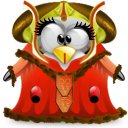How to think like a computer scientist
| Author |
Message |
wtd
|
|
|
|
 |
Sponsor
Sponsor


|
|
 |
Andy
|
 Posted: Fri Nov 12, 2004 5:38 pm Post subject: (No subject) Posted: Fri Nov 12, 2004 5:38 pm Post subject: (No subject) |
|
|
| i dont see how the name fits the tutorial at all... just by reading some stuff doesnt make u a computer scientist all of the sudden... doesnt matter how much stuff u read, without any problem solving skills you're still screwed |
|
|
|
|
 |
wtd
|
 Posted: Fri Nov 12, 2004 6:43 pm Post subject: (No subject) Posted: Fri Nov 12, 2004 6:43 pm Post subject: (No subject) |
|
|
| No, but the material is oriented at giving students and understand of what's going on, rather than just saying "memorize this". |
|
|
|
|
 |
Andy
|
 Posted: Fri Nov 12, 2004 8:17 pm Post subject: (No subject) Posted: Fri Nov 12, 2004 8:17 pm Post subject: (No subject) |
|
|
| yea i noe.. i was just commenting on the name of the whole thing |
|
|
|
|
 |
Martin

|
 Posted: Sat Nov 13, 2004 3:16 pm Post subject: (No subject) Posted: Sat Nov 13, 2004 3:16 pm Post subject: (No subject) |
|
|
Wow, that's really awesome.
I was expecting it to be a joke  "You know you're a computer scientist when..." "You know you're a computer scientist when..." |
|
|
|
|
 |
md

|
 Posted: Sun Nov 14, 2004 5:12 pm Post subject: (No subject) Posted: Sun Nov 14, 2004 5:12 pm Post subject: (No subject) |
|
|
I would not recommend the above to anyone based upon the following:
***** note all comments refer to the C++ text *****
In the part about formal languages I found the follwoing line:
Quote: The statement 3=+6$ is structurally illegal, because you can't have a plus sign immediately after an equals sign
Obviously the statement is incorrect, but it is structurally legal. You can have a + sign following an equals sign; you are simply specifying the sign of the number. Usually + signs are implied, however is is perfectly valid to write one.
After reading this line I'm not sure if I would recomend reading any more... if they make a mistake as fundamental as this, what's to say there arn't more, perhaps more fundamental, mistakes elsewhere?
Infact after a short read we find a small c++ 'program'. The problem is that the main function given is not a proper function.
The C++ standard specifies that any function which takes no arguments must explicitly state this by putting void between the argument brackets.
Even if this was done, the code would still not be valid as the Standard also defines a main function as returning an integer, and taking two parameters: an integer containing the number of parameters passed to the program, and a array of character strings containing those parameters (note: certain compilers for windows also allow the main function to take wide chars instead of chars; this is an extension to the standard).
In the first few pages there are two glaring errors, leading me to think that there is a high probablility of errors in the rest of the text. Based upon this I cannot recomend anyone read this unless they already know what the article talks about, otherwise it could lead to confusion, and error when actually implementing a program. |
|
|
|
|
 |
rizzix
|
 Posted: Sun Nov 14, 2004 5:21 pm Post subject: (No subject) Posted: Sun Nov 14, 2004 5:21 pm Post subject: (No subject) |
|
|
| agree.. your arguement brings perl to mind.. and it's unary + operator... but it appears that the site is language specific. |
|
|
|
|
 |
|
|

